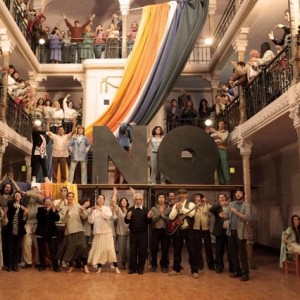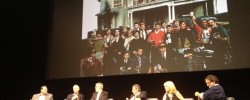
Review: No (2012)
Cast: Gael García Bernal, Alfredo Castro, Antonia Zegers
Director: Pablo Larraín
Country: Chile | France | USA
Genre: Comedy | Drama | History
Official Trailer: Here
Editor’s Note: No opens in limited release on February 15th
Arguably one of the most interesting filmmakers working in South America today—and certainly one of unjustly few to enjoy much attention outside of his native continent—Pablo Larraín has forged a directorial career addressing the latent traumas of a Chile led by General Augusto Pinochet, the brutal military dictator who ruled the country until 1988. The Oscar-nominated No is Larraín’s conclusion to a trilogy of films addressing life under Pinochet; following the stark pseudo-horrors Tony Manero and Post Mortem with a story of unlikely wit and charm, it dramatises the plebiscite with which the Pinochet regime aimed to internationally legitimise their rule by offering its public a simple democratic choice: yes or no.
Bernal, then, brings to René that likeability inherent in his wry smile and twinkling eye, that sense of nicety that always—no matter the transgressions of his protagonists—keeps us aligned to him…
 Larraín’s decision to shoot his scenes in a verité style with the film stock widely used by Chilean news reports of the time is an interesting one, allowing the narrative to blend seamlessly with contemporary footage—primarily that of Pinochet himself—and the film to attain a documentary verisimilitude that at once reinforces its status as historical document and allows it the liberty of certain dramatic licence. It’s an uncanny effect earned in exchange for the sacrifice of quality; the grainier aesthetic inevitably strips the picture of the kind of sharp images seen in Tony Manero and Post Mortem, yet it’s evidence aplenty of the visual craftsmanship of Larraín and regular cinematographer Sergio Armstrong that they manage to contort the format’s weaknesses to strengths, shooting their scenes with an inviting intimacy and making a strangely alluring visual motif of the stock’s distinct reaction to sunlight.
Larraín’s decision to shoot his scenes in a verité style with the film stock widely used by Chilean news reports of the time is an interesting one, allowing the narrative to blend seamlessly with contemporary footage—primarily that of Pinochet himself—and the film to attain a documentary verisimilitude that at once reinforces its status as historical document and allows it the liberty of certain dramatic licence. It’s an uncanny effect earned in exchange for the sacrifice of quality; the grainier aesthetic inevitably strips the picture of the kind of sharp images seen in Tony Manero and Post Mortem, yet it’s evidence aplenty of the visual craftsmanship of Larraín and regular cinematographer Sergio Armstrong that they manage to contort the format’s weaknesses to strengths, shooting their scenes with an inviting intimacy and making a strangely alluring visual motif of the stock’s distinct reaction to sunlight.
The casting of Gael García Bernal in the lead role of René, a rising advertising executive tasked with the management of the No campaign— Larraín regular Alfredo Castro is unsurprisingly impeccable as his counterpart—is of particular intrigue, not so much for the consummate strength of the performance, but for the qualities the actor brings to the role. René is a fundamentally flawed character, his motivations for the acceptance of this commission expressly posited as ignoble and selfish: he is less concerned for the fate of Chile than for his own livelihood, his ability to provide a comfortable existence to his son. He is, crucially and considerably, a selfish and cowardly character; indeed, much of the film’s more subtle and ultimately substantial points rest on his standing as such. Bernal, then, brings to René that likeability inherent in his wry smile and twinkling eye, that sense of nicety that always—no matter the transgressions of his protagonists—keeps us aligned to him, leaving Larraín the room to shape his arc and reveal to us the film’s precious truths.
Larraín is to Chile as filmmakers like Cristian Mungiu are to Romania: cathartic creators who, undeterred by the passage of time, return to examine a regime under which the socio-political power of cinema was largely denied the public and apply its modern possibilities to treating the wounds of the past.
 Those truths—dark, dramatic observances that this political case study expounds—are the beating heart of No, yet to dwell excessively on them would be to forget the film’s foremost aspect: it’s really funny. Comedy has always played a part in Larraín’s work, from the quasi-absurdism of his debut Fuga to the jet-black humour of the aforementioned entrants in this trilogy, but here it is for the first time foregrounded, the lightness of tone it brings integral to the film’s eventual effect. Pedro Peirano’s script—this is Larraín’s first film as director only—thrives on the sharpness of its dialogue, its political insight encrusted with delectable wit and delivered with a pithy panache few might have foreseen from the trilogy’s earlier films. Yet it’s indelibly linked to those films despite its comparable comic tone, the humour occasionally overturned with sudden, startling moments that remind us intently of the pain behind these sources of humour, that ensure our ability to laugh never obscures the memories of those who cannot.
Those truths—dark, dramatic observances that this political case study expounds—are the beating heart of No, yet to dwell excessively on them would be to forget the film’s foremost aspect: it’s really funny. Comedy has always played a part in Larraín’s work, from the quasi-absurdism of his debut Fuga to the jet-black humour of the aforementioned entrants in this trilogy, but here it is for the first time foregrounded, the lightness of tone it brings integral to the film’s eventual effect. Pedro Peirano’s script—this is Larraín’s first film as director only—thrives on the sharpness of its dialogue, its political insight encrusted with delectable wit and delivered with a pithy panache few might have foreseen from the trilogy’s earlier films. Yet it’s indelibly linked to those films despite its comparable comic tone, the humour occasionally overturned with sudden, startling moments that remind us intently of the pain behind these sources of humour, that ensure our ability to laugh never obscures the memories of those who cannot.
Larraín is to Chile as filmmakers like Cristian Mungiu are to Romania: cathartic creators who, undeterred by the passage of time, return to examine a regime under which the socio-political power of cinema was largely denied the public and apply its modern possibilities to treating the wounds of the past. The first instalments of this retro-referential trilogy resembled 4 Weeks, 3 Months, and 2 Days and The Paper Will Be Blue in their bleak dramatisations of life under an oppressive regime. No feels closer to something like 12:08 East of Bucharest, a film confident enough in its acceptance of the past to lampoon it with a rich and sensitive humour. Finding comedy where once there was only pain, No has the power to be a transitory work for its country and its director both, a therapeutic cinematic evaluation that treats the wounds of the past with the requisite reverence as it looks beyond them to find the strength to move on.
Related Posts
![]()
Ronan Doyle
![]()
Latest posts by Ronan Doyle (see all)































